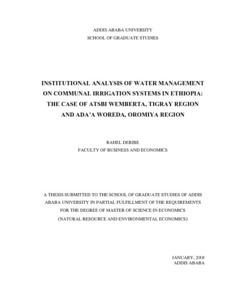Institutional analysis of water management on communal irrigation systems in Ethiopia: the case of Atsbi Wemberta, Tigray Region and Ada’a Woreda, Oromiya Region
This study analyses the institutional and organizational arrangements of irrigation water management and identifies the determinants of collective action and its effectiveness in managing communal irrigation schemes in the districts of Atsbi Wemberta (Tigray region) and Ada’a (Oromiya region), Ethiopia. Results are based on data collected from a survey of 169 groups (communities) and 22 scheme level focus group interviews. All tabias which have irrigation projects that operated, in year 2006/07 are included. Analysis of descriptive and econometric methods are used.





